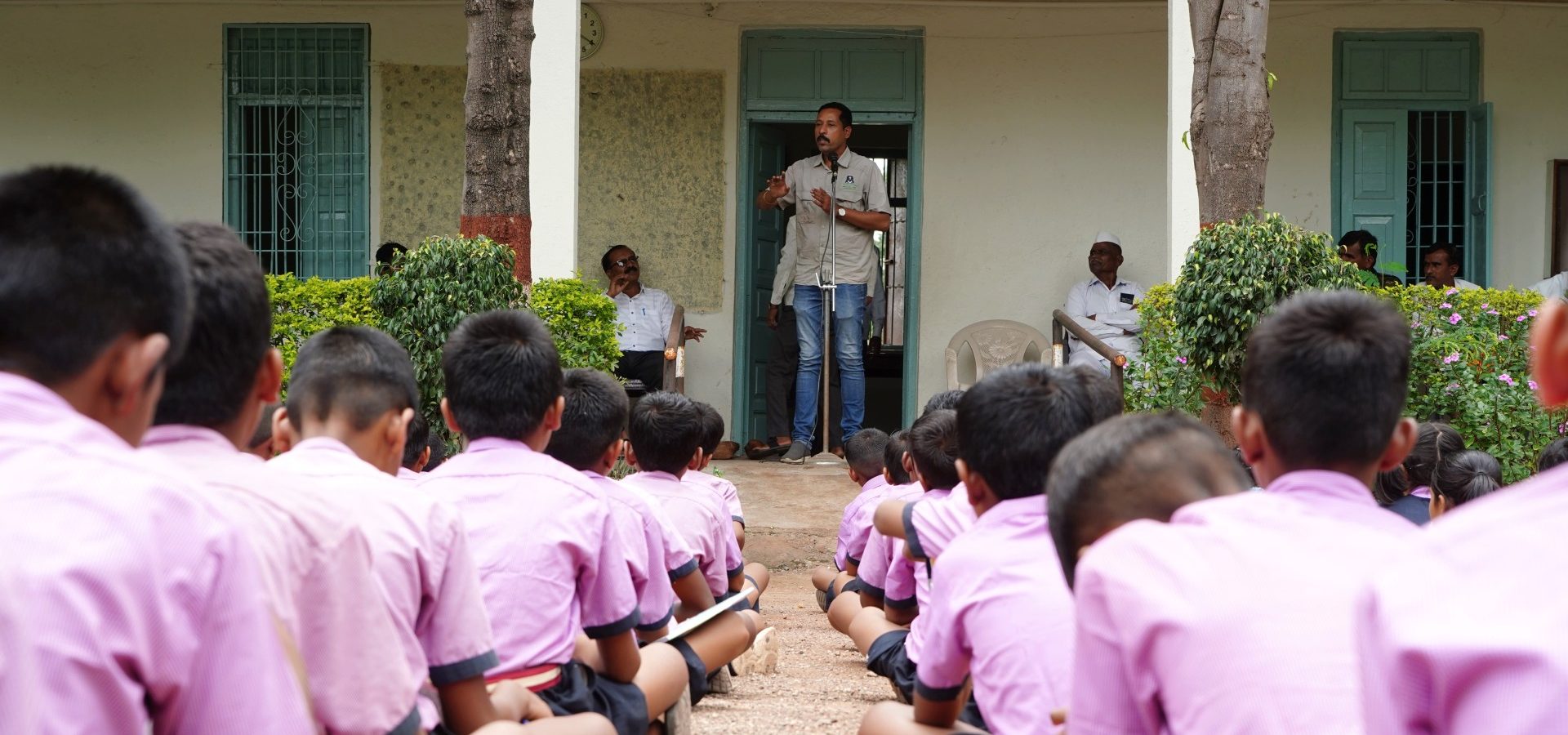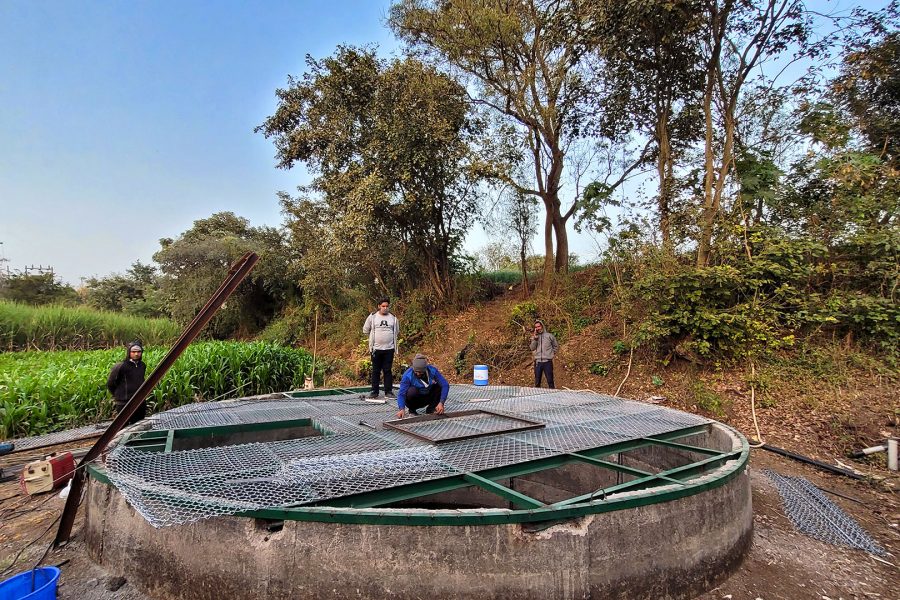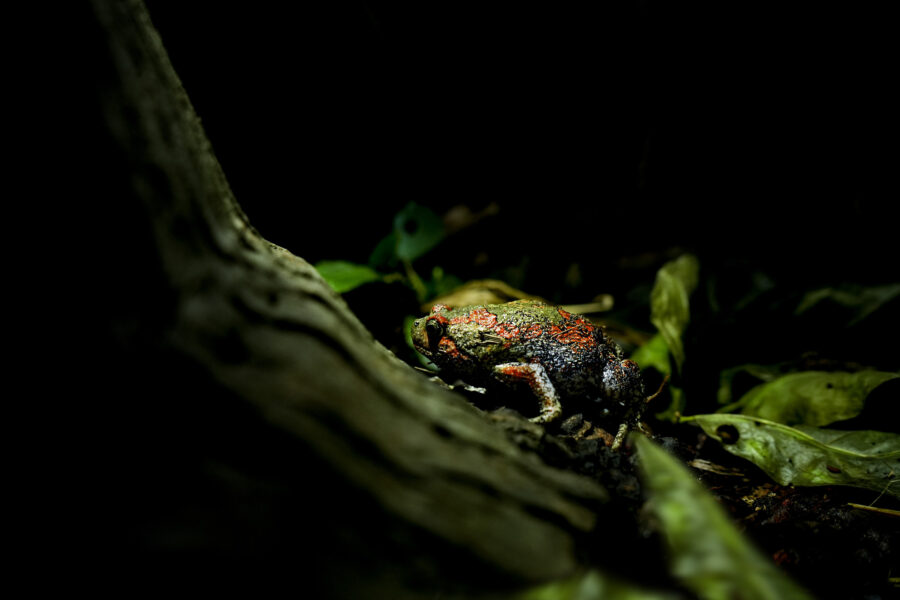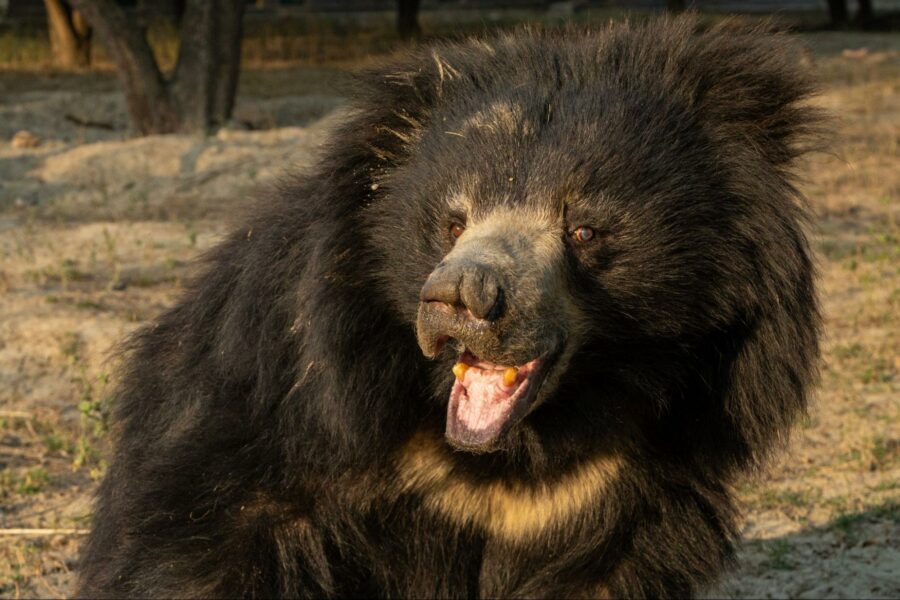At Wildlife SOS, the commitment to biodiversity conservation extends far beyond the walls of the rehabilitation centres. Multiple stakeholders, including forest and government officials, conservation researchers and the youth, are actively engaged through a diverse range of outreach events to promote environmental stewardship and wildlife protection. In July and August 2024, efforts ranged from tree plantation drives and snake awareness sessions to conflict mitigation programmes. These initiatives effectively showcase the holistic approach Wildlife SOS takes towards conservation.
Uttar Pradesh
Restoring Heritage Trees under ‘Virasat Vriksh Vatika’
Wildlife SOS was a pivotal part of a tree plantation initiative under the Uttar Pradesh government titled ‘Virasat Vriksh Vatika’. Through this project, the UP government aims to create 17 forests all over the state and has identified over 900 heritage tree species of the state that hold historical or mythical significance.
Wildlife SOS was charged with organising the plantation drive in an area identified in Mathura near the Wildlife SOS Elephant Hospital Campus. Approximately 10,000 tree saplings of peepal, kangi palm, banyan, moringa, peelu (Real mustard tree), kadamb (Burflower-tree), Indian siris (lebbeck), neem and many more were planted here. Mr. Shivam Rai, Head Coordinator of the Elephant Project at Wildlife SOS, played a crucial role in ensuring the success of the event that took place on August 14. Following the plantation, there was an awareness session held in Hindustan College where students of local schools had gathered. Official guests included the state’s Additional Principal Chief Conservator of Forests Sh. B. Prabhakar, Conservator of Forests, Agra Sh. Anil Patel, Divisional Forest Officer of Mathura Sh. Rajnikant Mittal, Range Forest Officer Sh. Atul Tiwari and forest guards. They spoke to the young audience about the importance of the initiative and the preservation of local plant species.
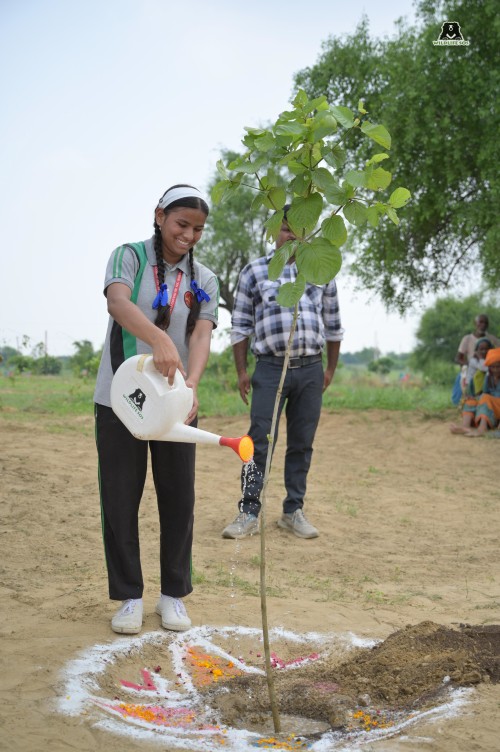
Workshop on Wildlife Crime Prevention in Agra
Wildlife SOS, in collaboration with the Social Forestry Division, hosted a Wildlife Crime Prevention Workshop at the Social Forestry Divisional Office in Agra aimed at equipping forest officials with various wildlife laws of India. One crucial part of the discussion was on the latest amendments that were made in August 2022 on the Wildlife (Protection) Act of 1972. The workshop happened on August 25, and drew over 50 officers, including forest guards and deputy rangers, with a focus on understanding critical laws designed to prevent and penalise wildlife crimes.
Esteemed guests Shri Satyanarayan Vashisht, Advocate of the Supreme Court and Delhi High Court, and Dr. Anil Kumar Patel, IFS, Conservator of Forests, led discussions on these vital statutes. Mr. Baiju Raj M.V., Director of Conservation Projects at Wildlife SOS, highlighted the growing threat of wildlife crimes, particularly those involving reptiles, and underscored the importance of effective snake rescue operations in Agra and surrounding areas. The workshop served as an essential platform for reinforcing the roles and responsibilities of forest officers in safeguarding wildlife.
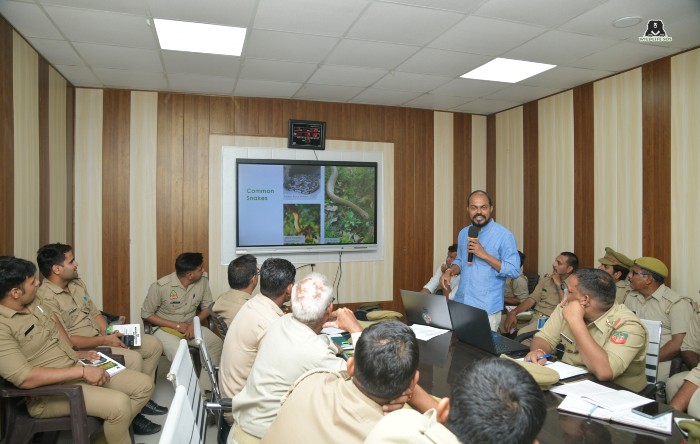
Plantation Drive in Dadri Range
Wildlife SOS was invited to join the Uttar Pradesh Forest Department for a tree plantation programme in the Dadri range of Gautam Buddha Nagar on August 28. Native species of the area were planted in the presence of the Chief Conservator of Forests, Meerut Zone Sh. N.K. Janu from Indian Forest Services (IFS) and Divisional Forest Officer of Noida, Sh. Pramod Srivastava (IFS). Local NGOs along with approximately 100 students from schools participated in this afforestation drive. Wildlife SOS conducted a session at the site where valuable insights on human-wildlife conflict, deforestation due to climate change, and the tragic depletion of green cover were shared. The students were encouraged to adopt ways to mitigate environmental degradation so that rewilding of forests and green zones can take place.
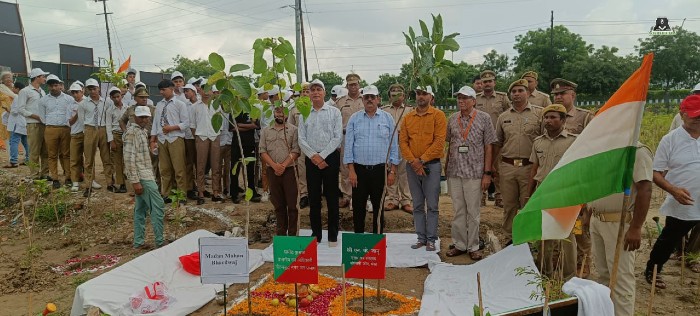
Karnataka
Addressing Human-Elephant Conflict through Academia
The Karnataka Forest Department organised an International Conference on Human-Elephant Conflict (HEC) on August 12 in the state’s capital, Bengaluru. This pioneering effort brought forest department officials, academic researchers and civil society organisations to cultivate a knowledge-sharing platform about HEC.
Mr. Swaminathan Shanmugavelu, Senior Field Biologist at Wildlife SOS, was honoured with the Best Research Paper award for his presentation titled “Newly Colonised Wild Elephants (Elephant maximus), Human-Elephant Interface, and Mitigation Measures in the Highly Fragmented Landscape of Central Chhattisgarh”. The paper provides an in-depth analysis of the range extension and behaviours of wild elephants along with the human-elephant encounters in six different districts of central Chattisgarh through the analysis of data collected over five years.
Wildlife SOS takes immense pride in this achievement and remains committed to advancing its conservation efforts through academic research.
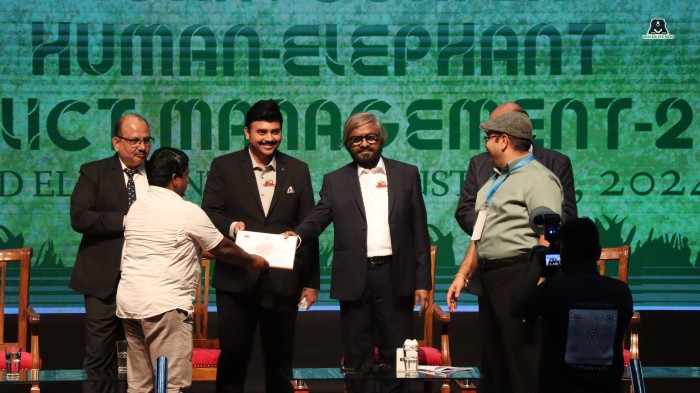
Delhi-NCR
Celebrating World Snake Day in the Zoo!
On July 16, in commemoration of World Snake Day, Wildlife SOS was invited to the National Zoological Park in New Delhi to deliver an awareness talk on snakes. The event was organised in collaboration with Mr. Sanjit Kumar, IFS, Director of the National Zoological Park, and Dr. Manoj Kumar, Curator of the National Zoological Park.
It was a celebration like none other, filled with extensive exploration of snakes. Mr. Srinu Srikanta Maharana, Senior Research Assistant at Wildlife SOS, led an informative session that captivated the attending school students by highlighting ways to identify common snake species and how to distinguish the ones that were venomous snakes. He also stressed upon snakes being vital for our ecosystems. The session concluded with an engaging Q&A session, followed by a walk around the zoo’s reptile area, leaving the students with a sensitive understanding of the need for peaceful coexistence with urban wildlife.
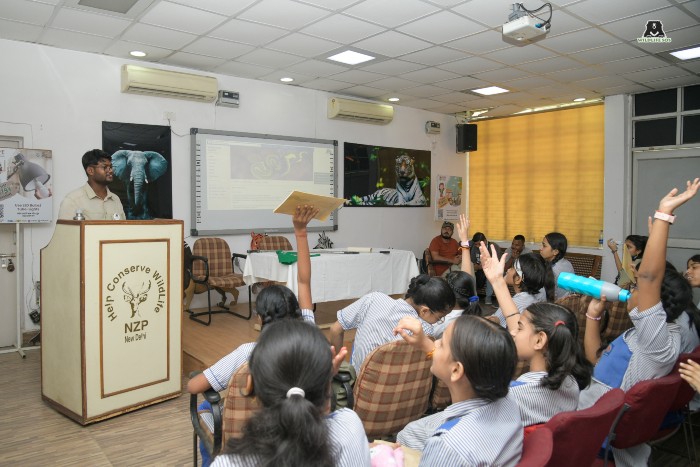
Herpetology Workshop on Nag Panchami
In an effort to bolster public awareness about wildlife conservation, Wildlife SOS was invited by the Delhi Forest Department for a comprehensive herpetology workshop at the Asola Bhatti Wildlife Sanctuary. This workshop was conducted on August 9 in celebration of Nag Panchami. The Chief Wildlife Warden, Deputy Conservator of Forests, and Deputy Conservator of Forests-South were among the invited guests along with other forest officials, young students, and children accompanied by parents.
Mr. Baiju M. V., Director of Conservation Projects at Wildlife SOS, led an educative session about various snake species found in Delhi in addition to essential safety guidelines to be followed and medical action to be taken. The session concluded with a demonstration of proper snake-handling techniques by experts. The event served as a reminder of the significant role reptiles play in our ecosystem, and emphasised the importance of individual responsibility in protecting these fascinating creatures.
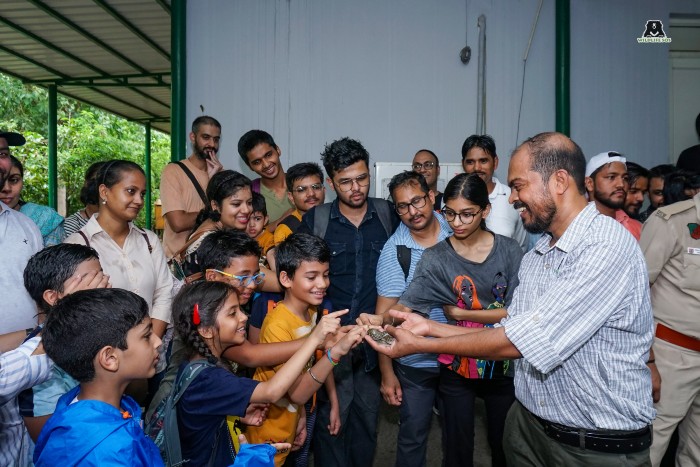
Snake Workshop for the Ministry of Communications
In a nod to the organisation’s expertise in wildlife conservation, Wildlife SOS was invited to hold an awareness session on August 13 at the National Institute of Communication Finance, Ghitorni. Given the many snake sightings within the campus, Mr. Wasim Akram, Director of Sustainability & Special Projects at Wildlife SOS, delivered an informative presentation on the serpents that reside in the area. He also provided crucial guidance to the attendees about ways to differentiate between venomous and non-venomous snakes. Everyone from the director of the institute to the field staff are now well equipped with practical knowledge to mitigate situations of encounter with reptiles.
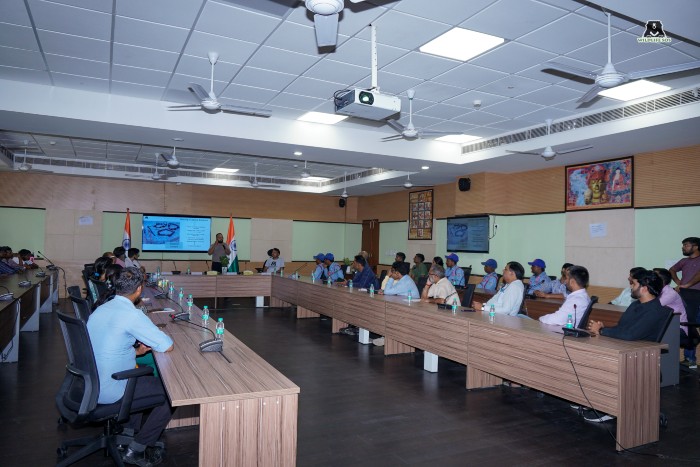
Maharashtra
Conservation Education for Students from 12 Schools
Wildlife SOS is dedicated to raising awareness about wildlife conservation among youths and children. Guiding young minds towards developing a holistic understanding about wildlife is an important step to generate respect for animals and their habitat. With such a vision, Wildlife SOS conducted workshops for students from 12 schools in Maharashtra all through July and August. These included Sabnis School, Sabnis Junior College, Manjarwadi School from Junnar Range, Adarsh English School, Jay Malhar School, Shree Datta School and Chandav School in Shirur Range, and New English School, Chaitanya School, Gadge Maharaj School, Subhash Vidyamandir School and Umbraj School in the Otur Range.
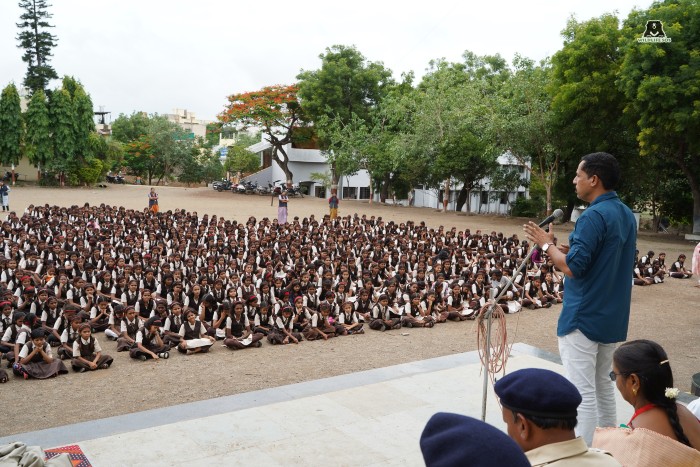
Leading the initiative was Mr. Mahendra Dhore, Wildlife SOS’s Project Manager at the Manikdoh Leopard Rescue Centre (MLRC), who talked about the importance of respecting wildlife, understanding leopard behaviour and feeding patterns, and essential precautions to mitigate human-leopard conflict. The sessions provided significant insights to students who were eager to learn about what actions to take upon encountering a leopard.
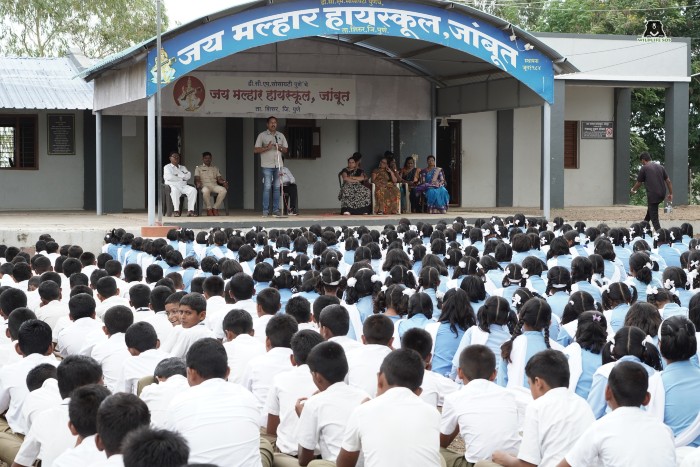
Human-Leopard Conflict Mitigation Training at MLRC
Wildlife SOS conducted a series of human-leopard conflict mitigation training sessions at the Manikdoh Leopard Centre (MLRC). Training sessions were held for 25 officials from the Delhi Forest Department on July 22, 100 trainees from the Chikhaldara Forest Training Centre on July 31, 100 staff members of the Pune Social Forest Department on August 13, and 120 trainees from the Kudal Forest Department Training School on August 20. The training sessions were overseen by Mr. Mahendra Dhore, Wildlife SOS’s Project Manager at MLRC.
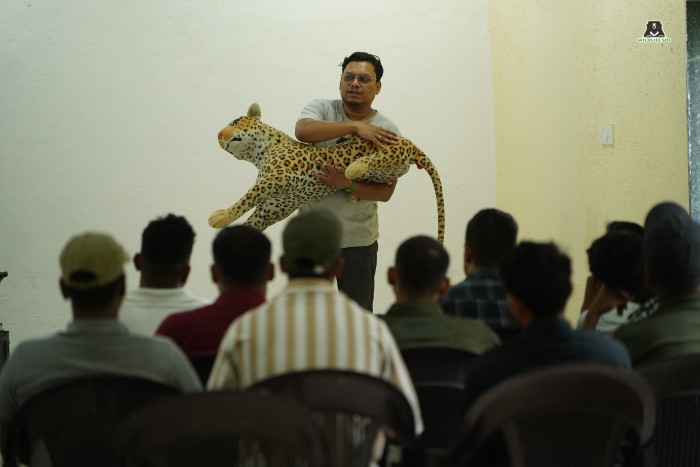
Newly inducted trainees in the forest services are required to participate in a training tour, which includes a visit to MLRC, Wildlife SOS’s leopard rescue centre. During this tour, they receive a comprehensive overview of leopard behaviour and ecology. However, the primary focus is on providing them with skills for conducting appropriate leopard rescues.
Trainees are apprised of how to effectively manage challenging instances such as a leopard entering a house or village, or the large feline being found injured by the roadside. The training emphasises the importance of ensuring both human and animal safety during such situations. Additionally, the trainees are prepared to host awareness sessions in villages, educating the local population on how to mitigate conflict with leopards and remaining calm during unexpected encounters.
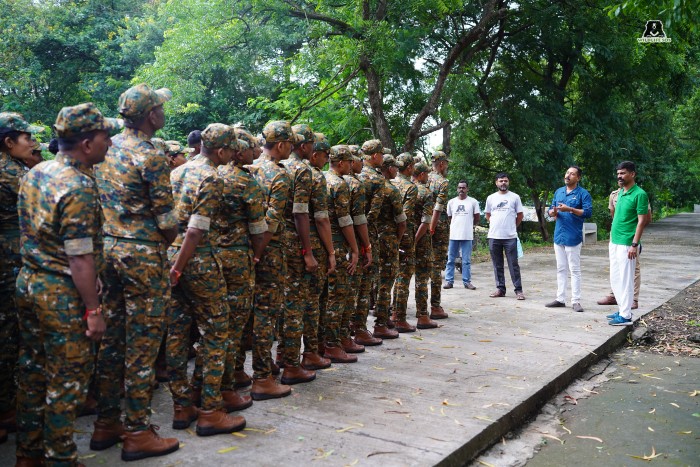
Jammu & Kashmir
Mobilising the Youth in Anantnag
After a leopard scare in the month of June in Anantnag, Jammu & Kashmir, a critical need arose to not only carry out rescues, but also gain the trust of the local population so they can help in mitigating leopard conflict. Recognising the role of young people, Wildlife SOS in collaboration with the Wildlife Protection Department held a training session on July 1 for the young men of the area. The session emphasised how the youth can take proactive action with rescue calls, playing a key role in handling potentially volatile situations, helping to manage crowds, and ensuring the safety of both the animal and the public.
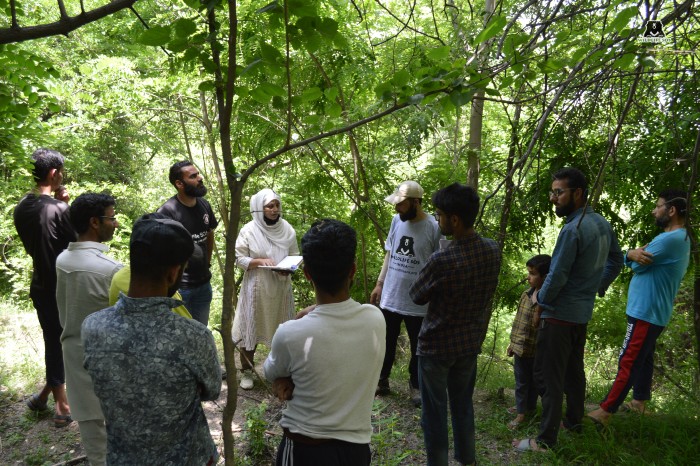
Training Women in Baramulla
The Baramulla region of Jammu & Kashmir has been a focal point for human-leopard conflict. Recognising the importance of targeted education, Wildlife SOS focused on raising awareness among the women in the community. Over 50 women participated in an interaction about how to tackle encounters with wildlife held on July 12. Education Officer and Programme Head with Wildlife SOS, Ms. Aaliya Mir, emphasised waste disposal practices as it poses as the key cause for conflict in the area. She highlighted that improper waste disposal attracts stray dogs, which subsequently lures leopards into human settlements. By managing waste correctly, the community can disrupt this chain and mitigate the risk of conflict.
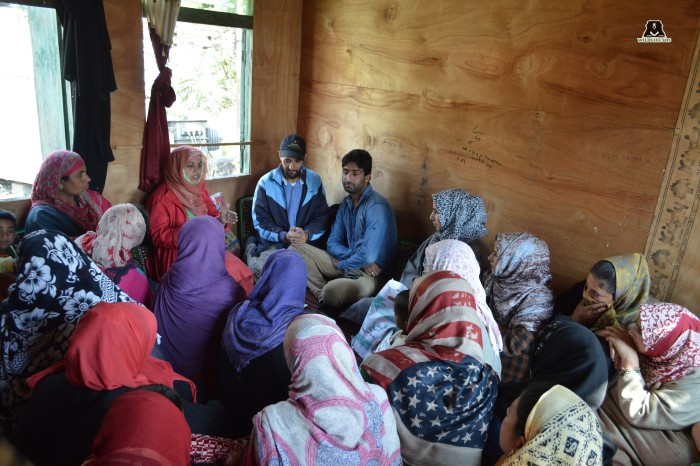
Nature Walk with College Students
On July 24, a nature walk was organised in Tangmarg with 70 students from the Bemina Degree College. Ms. Aaliya Mir, Wildlife SOS Education Officer and Programme Head, led discussions focused on the local flora and fauna, explaining the ecological significance of these natural resources and their scientific importance. A follow-up session took place in Dachigam National Park to continue the interaction and enhance knowledge for the curious students.
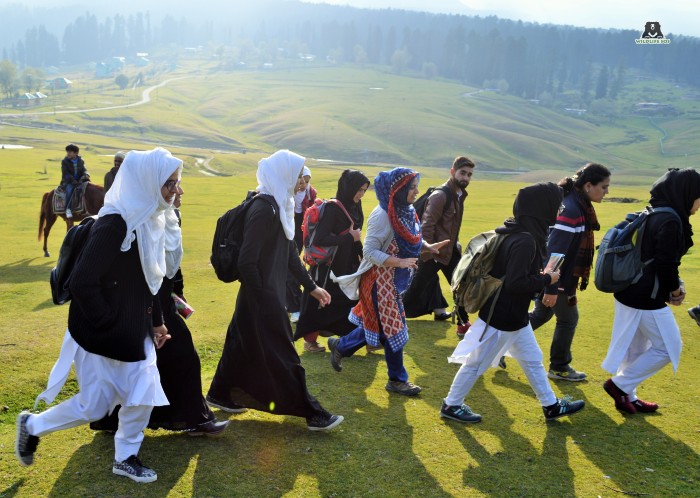
Whether it’s at your school, university, or workplace, Wildlife SOS invites you to connect with our team of experts to help make a difference to protect our precious wildlife. Reach out to us at education@wildlifesos.org to organise an impactful awareness session at your institute!

